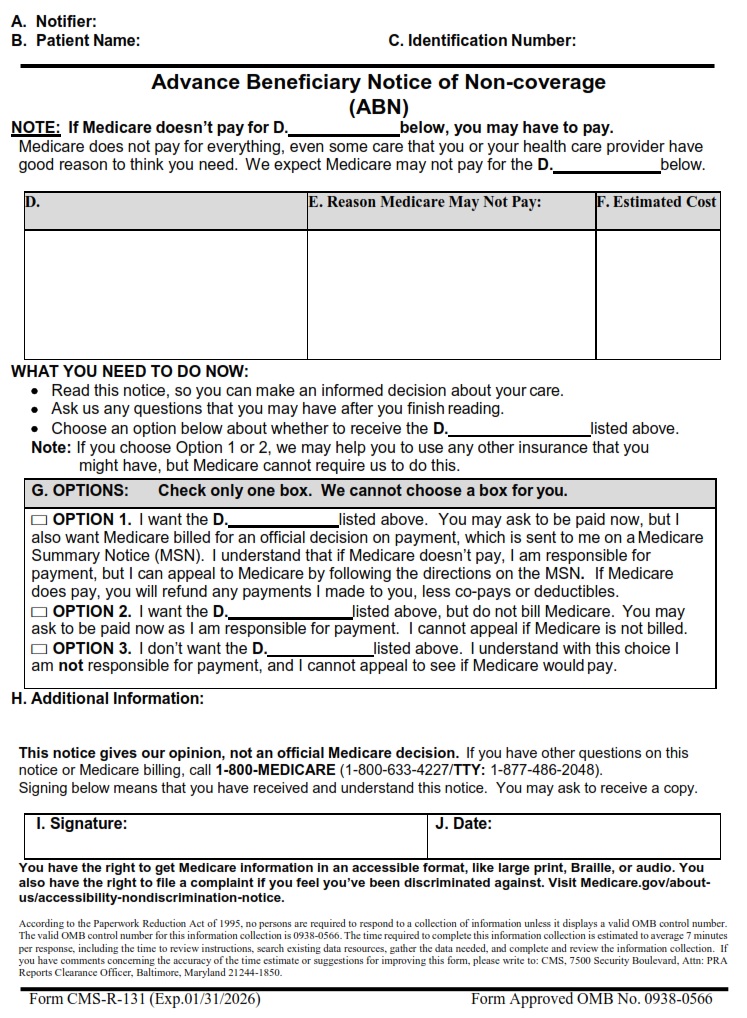CMSFORM.ORG – CMS R-131 – ADVANCE BENEFICIARY NOTICE (ABN) (English) – Navigating the complexities of healthcare billing can often feel like deciphering a secret code, with acronyms and forms adding layers of confusion for patients and providers alike. One such form that plays a crucial role in informing Medicare beneficiaries about their financial responsibilities is the CMS R-131 – Advance Beneficiary Notice (ABN). Understanding this document is not just a matter of compliance, but a key tool in empowering patients to make informed decisions about their care. In this article, we delve into the intricacies of the ABN form, unraveling its significance and shedding light on how it impacts both patients and healthcare providers in ensuring transparency and clarity in medical billing processes.
Download CMS R-131 – ADVANCE BENEFICIARY NOTICE (ABN) (English)
| Form Number | CMS R-131 |
| Form Title | ADVANCE BENEFICIARY NOTICE (ABN) (English) |
| Published | 2011-03-01 |
| O.M.B. | 0938-0566 |
| File Size | 218 KB |
CMS R-131 - ADVANCE BENEFICIARY NOTICE (ABN) (English) (1960 downloads )
What is a CMS R-131?
CMS R-131, also known as the Advance Beneficiary Notice (ABN), plays a crucial role in healthcare by informing Medicare beneficiaries of potential financial liability for services or procedures deemed not medically necessary. It serves as a notification tool that allows patients to make informed decisions about their care and understand the cost implications involved. This form must be provided before rendering services that may not be covered by Medicare, ensuring transparency in healthcare transactions.
One key aspect to note is that CMS R-131 does not guarantee payment from the patient; instead, it acts as a disclosure mechanism to manage expectations regarding coverage and out-of-pocket expenses. Healthcare providers are obligated to issue this notice when there is uncertainty about insurance coverage, setting clear boundaries between what will be reimbursed and what might fall under the individual’s responsibility. Understanding and effectively utilizing CMS R-131 can lead to improved patient-provider communication, enhanced financial outcomes for both parties, and ultimately contribute to a more efficient healthcare delivery system.
Where Can I Find a CMS R-131?
If you’re on the hunt for a CMS R-131 form, don’t fret – there are several avenues you can explore to acquire this essential document. One option is to reach out to your healthcare provider or medical facility, as they often have these forms readily available for patients. Additionally, you can visit the official website of the Centers for Medicare & Medicaid Services (CMS) to download a digital copy of the CMS R-131 form.
Another convenient way to obtain a CMS R-131 form is by contacting your insurance company directly. Many insurers offer resources and support related to Medicare benefits and documentation, making it easier for beneficiaries to access important forms like the CMS R-131. By leveraging these various channels, you can ensure that you have the necessary paperwork in hand when navigating the complexities of healthcare billing and coverage.
CMS R-131 – ADVANCE BENEFICIARY NOTICE (ABN) (English)
CMS R-131, also known as Advance Beneficiary Notice (ABN), plays a critical role in ensuring transparency and informed decision-making in healthcare. This standardized form is designed to inform Medicare beneficiaries about potential costs that may not be covered by Medicare for specific services. By providing clarity on these financial responsibilities upfront, ABN empowers patients to make well-informed choices regarding their healthcare options.
One key aspect of CMS R-131 is its emphasis on patient autonomy and choice. By presenting individuals with the estimated costs of services that may not be covered by Medicare, the ABN allows beneficiaries to weigh their options based on both medical necessity and financial considerations. This process helps foster a sense of ownership over one’s healthcare decisions and promotes a collaborative relationship between patients and healthcare providers. Additionally, the proper utilization of ABNs can prevent unexpected out-of-pocket expenses for patients, leading to greater satisfaction and trust in the healthcare system.
In essence, CMS R-131 – Advance Beneficiary Notice serves as a valuable tool in promoting transparency, accountability, and patient-centered care within the realm of Medicare services. It acts as a safeguard against hidden costs and surprises, empowering beneficiaries to take an active role in managing their health outcomes while fostering open communication between providers and patients. Through clear communication facilitated by the ABN process, individuals can make informed choices aligned with their preferences and financial circumstances—a pivotal step towards enhancing overall quality of care in the constantly evolving landscape of healthcare delivery.
